Being unemployed is tough. And it only gets tougher the longer you’re out of work. A study by the Urban Institute found that longer unemployment led to lower well-being for both the unemployed and their family. Plus, when long term unemployed re-enter the workforce, they often earn less.

We don’t want that.
As a career coach, I recommend a different plan of attack for someone who is unemployed compared to someone who is currently working but hoping to find a new job.
So, what should you do when you’re unemployed and looking for remote work?
1. Determine Your Career Ideals
Just because you’re out of work doesn’t mean you need to take any remote job. Instead, you need to determine your career ideals.
Your career ideals are the must-haves and have-nots when it comes to the way you work.
Example of career ideals include:
- Your working hours – Do you need a steady 9 to 5 or are you a night owl?
- Type of job responsibilities – Hate customer service but prefer data entry?
- Pay rate – Need to earn a bare minimum of $15/hour?
- Benefits eligibility – Is health insurance a must have through your employer?
- Schedule – Are you only able to work certain days or times?
Only you know your career ideals. When you’re unemployed is the perfect time to reflect on them.
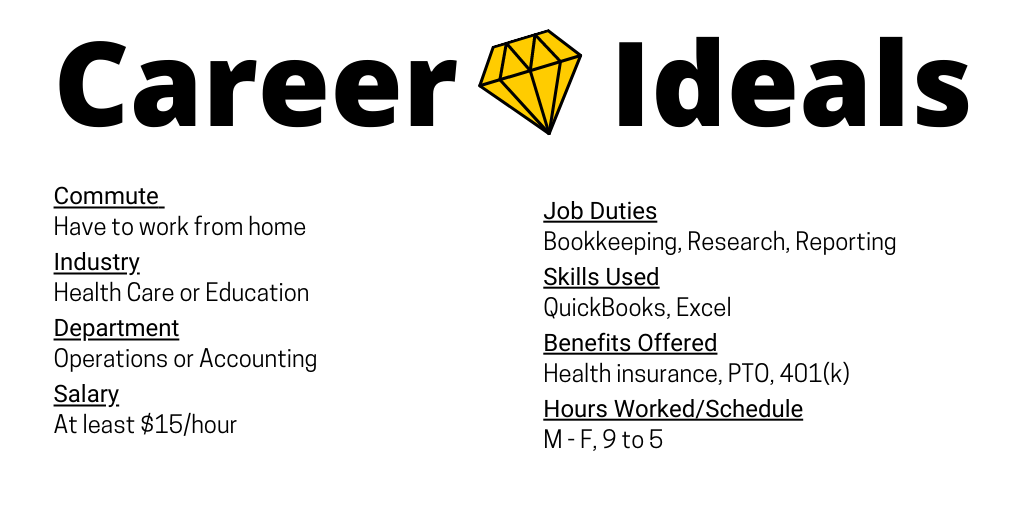
Think about past positions. What did you like about them? Can you remember what you hated? Name some tasks or skills you used that coworkers would compliment you on.
For example, “Ashlee is so good at making spreadsheets!” (I’m not, but it’s just an example).
Hint: It’s often easier for us to look back and remember things we hate about jobs. And that’s good to know what you dislike so you can avoid those tasks/things in the future. But it’s equally important to know what you do like. That way you can target those types of jobs in the future. It’s not always so easy to come up with tasks, skills, and responsibilities we enjoy at work.
So seriously take a few minutes right now to reflect on your past employment. Grab a pen and paper or open up a Google Docs. Jot down your haves and have-nots when it comes to remote work.
2. Determine Your Remote Work Type
I have a son. If you ask him what Mom does, he’ll say, “She works from home.” He’s not wrong. But he believes that working from home is a job in and of itself. Oddly enough, a lot of unemployed remote job seekers think this way too.
As a career coach, I ask clients, “What kind of job are you looking for?”
And, a large majority simply reply, “I want to work from home.”
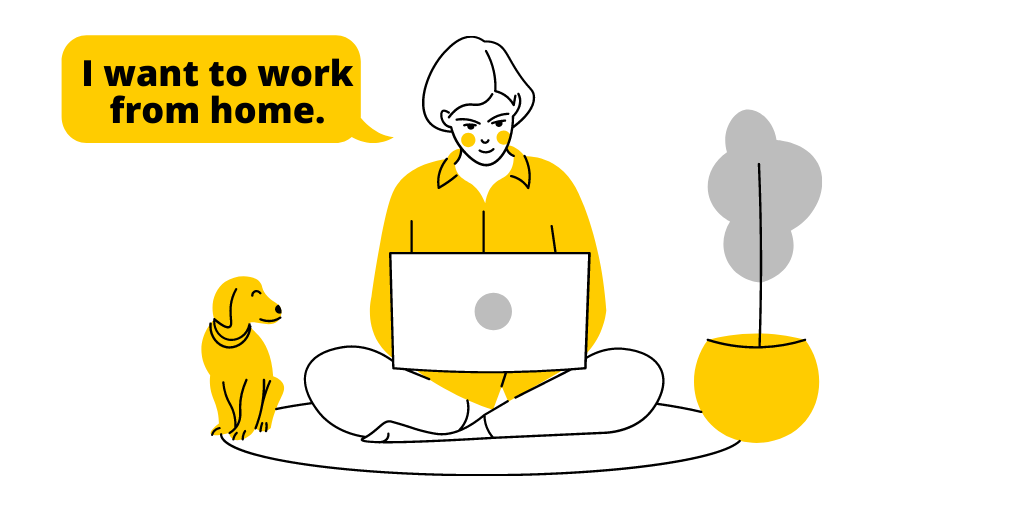
The truth is, there are A LOT of work from home jobs. And as someone who is unemployed looking for remote work, you need to determine your remote work type.
Remember, not all remote jobs are created equal.
You have employee positions, freelance, and contract options to consider. Each come with their own unique pros and cons. You will use your career ideals you determined in Step 1 to help you figure out your remote work type.
Employee
Employees who work from home are just like in-office ones. The difference? Well, you don’t have to commute every day. As an employee, you are benefits eligible, have taxes withheld from your paychecks, and can count on a pretty consistent schedule and hours worked weekly.
This also means you are expected to virtually show up for work every day, be available during office hours, and maintain a consistent schedule, i.e., Monday through Friday, 9 to 5.
Employees need a quiet, distraction-free office to work from. In other words, you cannot pull double duty as a remote work employee. So, you can’t teach your kids as distance learners and work at the same time. (Seriously, don’t do it).
If your career ideals include steady schedule, set pay, and benefits, employee positions are a good fit for you.
Freelance
Freelancers are service providers. They sell their services for a set rate. Some popular types of freelance jobs include freelance writer, freelance proofreader, freelance virtual assistant, and freelance typist. This is just short list of common freelance jobs. If you can do it, chances are you can sell it as a freelance service.
Freelancers are not employees. That means taxes are not withheld from payments received and there are no benefits like PTO or health insurance.
A freelancer can work whenever and wherever they want and pick and choose the projects they take. However, freelancers are completely responsible for finding their own work and need to pitch their services to potential clients.
Many freelancers turn to LinkedIn to find clients or use popular freelance marketplace sites like Upwork to get started.
If your career ideals include flexibility, unlimited earning potential, and work from anywhere, freelance is a good fit.
You can learn more about popular freelance career paths and how to develop those skills and turn them into a business on my Resources Page under “Remote Skills & Professional Development.”
Contractor
Contractors work with companies on a 1099 basis. As a 1099 worker, you are not an employee and will not have taxes withheld from your checks. Instead, you are responsible for paying quarterly estimated taxes.
Contractors have greater schedule flexibility than employees but less flexibility than freelancers.
That’s because, as a contractor, work is provided for you (you don’t have to pitch to get it). As such, the company you contract with will expect you to have your work done during certain times and/or days.
ModSquad is a good example of a company that routinely hires contractors to work from home.
If your career ideals include flexibility but consistency, contract work is a good fit.
How to Determine Your Remote Work Type?
A lot of clients I work with get hung up on their remote work type. And this really illustrates why it is so important to determine your career ideals. They will point you in the right direction.
In the meantime, I’ve created this flowchart to help you make your decision:
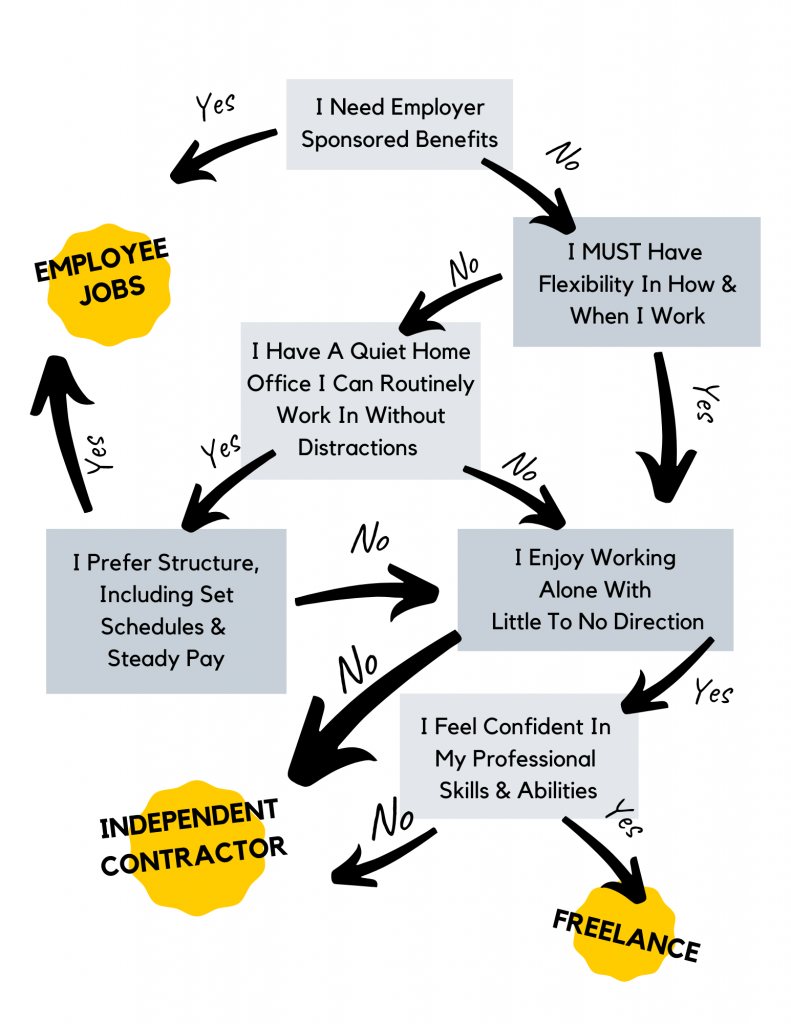
It looks overwhelming, I know. But start at the top, answer the questions honestly, and it will point you (see what I did there?) in the right direction. I promise.
3. Give Yourself a Remote Work Goal
When you’re unemployed, you need a sense of purpose. There is a big link between unemployment and self-esteem. And the longer the unemployment goes on, the worse off you feel.
We want to avoid feelings of desperation and hopelessness. A great way to do that is to give yourself a remote work goal.
Goal setting is important for job seekers. According to Butler University, goal setting can help you feel better, improves focus, and promotes a sense of purpose. This sense of purpose is extremely important for job seekers.
That’s why, as a career coach, I help job seekers create SMART goals.
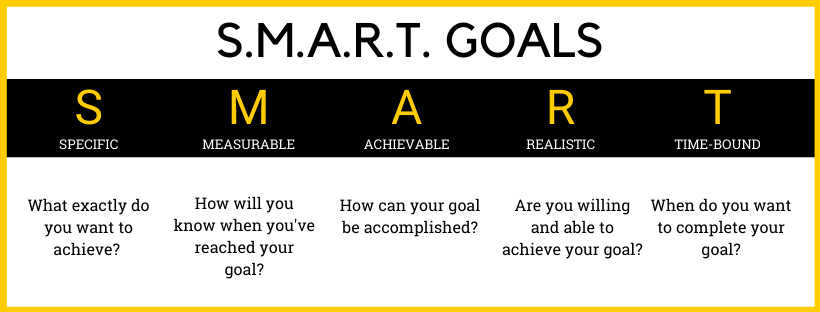
Grab your pen and paper again or open up that same Google Doc you used for your career ideals. Now add a goal for yourself.
Most remote job seekers simply say my goal is to “find a work from home job.” But you’re not like most remote job seekers and you can do better than that.
Remember, use your career ideals and remote work type to set a specific career goal for yourself.
For example, “I will land a remote employee role within the next six months in education that pays me $50,000 a year, offers great benefits, and steady pay.”
See how much more concrete and clear that goal is? SMART goals are more effective and work better for remote job seekers.
And make sure you write it down! I don’t care if it’s on a post-it note, in your bullet journal, or on a card in a Trello board. Studies show you are far more likely to achieve a goal just by writing it down.
4. Create a Remote Job Search Schedule
When you’re unemployed, you suddenly find yourself without a schedule. And as humans, this isn’t good. We are, after all, creatures of habit and our jobs play a big role in our daily habits.
After years of getting up, getting dressed, and getting out the door (or to your home office) you suddenly find yourself with no timeline to stick to. This can easily lead to procrastination and loss of motivation.
Before you know it, you’re not sure what day it is or when the last time you left that house was. We don’t want you to get to this point.
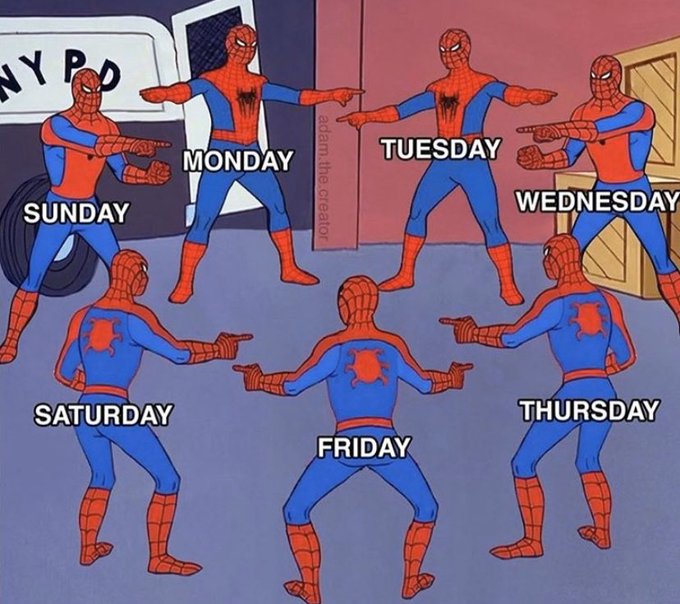
That’s why I recommend unemployed remote job seekers create and stick to a job search schedule.
So, what does a remote job search schedule look like? Great question.
It doesn’t have to be incredibly detailed or entirely time blocked (unless that’s your thing, then you do you). But, you should have a list of tasks to complete every day, Monday through Friday, just as if it were your job — because it is your job to find a remote job.
Sample Remote Job Search Schedule
- Wake up at the same time every day
- Shower and get dressed
- Look at your written down job search SMART goal
- Check your email for any communication from potential employers, i.e., interview requests — Look in your spam folder too
- Hop on LinkedIn. Check out remote-friendly companies and make valuable connections. Join groups. Check for any new job leads
- Take a lunch break and stretch your legs
- Check your email after lunch for any job-related communication
- Browse job boards for any new leads that interest you. Save them
- Apply to all the jobs you found during your afternoon search
- Make sure you optimize your resume for every single one
- Keep track of every job you apply to including the link to the ad and contact information
- Send follow up emails to positions you’ve applied to but haven’t heard back from yet
- Check your email one last time before heading out for the day
- Walk away from your job search until tomorrow
The Effortless Remote Job Search
Yes, looking for a remote job is your job when you’re unemployed. But it doesn’t mean it has to be a full time job.
That’s why I created The Effortless Remote Job Search. It’s a crash course that teaches remote job seekers how to save time on the search part of their job search, so they can spend more time on job search activities that actually get results like optimizing resumes, making LinkedIn connections, and networking.
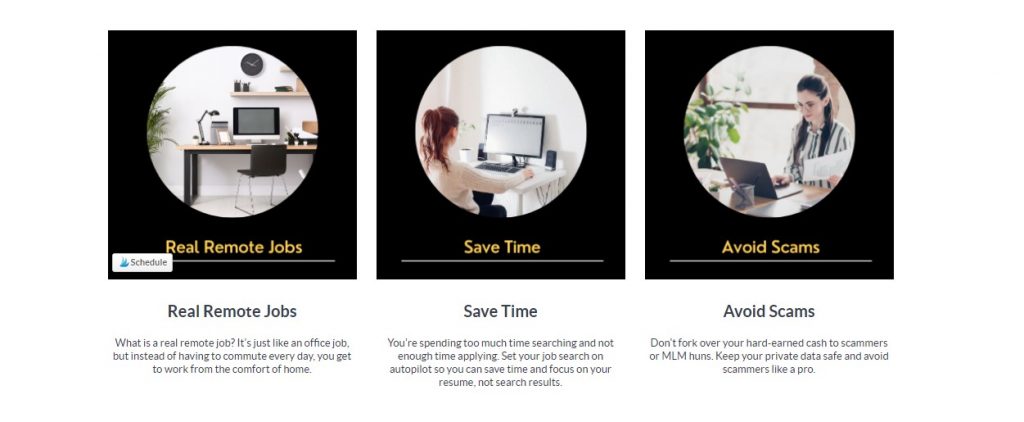
Here’s what you’ll learn:
- How to job search effectively on LinkedIn
- The 3 best remote job boards to avoid scams
- Discover thousands of remote jobs with Google
- Remote-friendly staffing agencies to supplement your search
You’ll also learn where you can automate your job search so job leads get delivered to you.
Plus, bonus content that includes:
- LinkedIn Profile Checklist
- Job Search Tracker
- Now Hiring Spreadsheet
- Scam-Guard Checklist
- List of Hundreds of Remote-Hiring Companies
The best part? You can enroll in this time-saving, scam-protecting course for just $27.
How to Find a Remote Job When You’re Unemployed
Being unemployed is tough. It takes a toll on your mental, financial, and emotional health.
Fortunately, you can take steps to keep your job search on track so you can find a job quickly and easily.
Remember, you don’t want to find any ol’ remote job. Instead, determine your career ideals and let them guide your job search. It’s amazing how much simpler and effective your remote job search becomes when you have career clarity.
From there, determine your type and give yourself a SMART goal. Now, you can tackle each unemployed day with a sense of purpose and meaningful schedule.
And, if you need help, reach out! I’m a Certified Professional Career Coach that specializes in remote work. I have career coaching sessions available specifically for remote job seekers who need help with goal setting, identifying career paths, and jump-starting their remote job search.
Send me an email to introduce yourself and inquire about my services.
You’ve got this.
Happily,
Ashlee
P.S. This post might contain affiliate links. Check out my disclosure statement to learn more.

Such amazing writing about career. Much appreciated